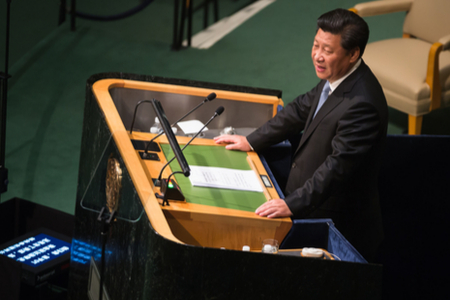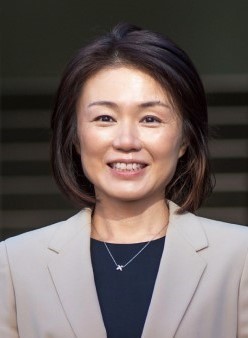“API Geoeconomic Briefing” is a weekly analysis of significant geopolitical and geoeconomic developments that precede the post-pandemic world. The briefing is written by experts at Asia Pacific Initiative (API) and includes an assessment of burgeoning trends in international politics and economics and the possible impact on Japan’s national interests and strategic response. (Editor-in-chief: Dr. HOSOYA Yuichi, Research Director, API; Professor, Faculty of Law, Keio University; Visiting Fellow, Downing College, University of Cambridge)
This article was posted to the Japan Times on April 18, 2022:
API Geoeconomic Briefing

Photo: Shutterstock
April 18, 2022
China’s bid to wage cognitive warfare over democracy and human rights
ETO Naoko
Professor, Department of Political Science, Faculty of Law, Gakushuin University

With the rise of China as an economic superpower, how will the international order change?
In recent years, the administration of Chinese President Xi Jinping has been offering a response to this long-debated issue from a new standpoint.
It asks us to reevaluate the criteria by which the West considers China’s rise as “anomalous” in the first place.
Such an argument by China that runs counter to our fundamental value recognition is being cleverly spread in the global community where confidence in values and norms is weakening amid a worldwide deterioration of democracy, a decline in economic activities running on the wheels of neoliberalism and globalization, and a malfunction of democracy apparent in the division of American society.
The Xi administration is attaching particular importance to redefining democracy and human rights.
Regarding democracy, the administration claims that there is a Chinese-style system based on what it calls “whole-process people’s democracy,” and that “whether a country is democratic or not should be left to its own people to decide.”
Considering that democracy is seen in various processes and levels around the world, Xi’s argument that democracy should be diverse and should be judged by its people may sound pleasing to the ear and even convincing.
However, we should be wary of being subjective in making judgments.
When assessed objectively, China does have a system that allows people to participate in politics to some extent, but it lacks a system of checks and balances that functions against political power and does not guarantee freedom of speech. As such, we cannot call it a democratic system.
The concept of democracy stipulated by the Xi administration only represents a broad range of political situations in which citizens can exercise political power. It differs from democracy as a political system that has been discussed in the field of political science — democracy that works under such indicators as to what degree it allows people to lodge public objections or get involved in politics, as well as the degree of freedom in society.
In other words, China is trying to make the Chinese-style political system accepted as part of a diverse democracy by deliberately simplifying the interpretation of democracy as equal to political participation.
The Xi administration is probably intentionally defining democracy as a value in a broad sense and is attempting to subjectively evaluate a system that puts it into practice.
Reverse thinking
Why is China trying to “replace” the concept of democracy?
In China, after then-leader Deng Xiaoping adopted an open-door policy in the 1970s, various political ideologies such as democracy and liberalism began to flow in from abroad.
The Chinese Communist Party-led regime had been vigilant against this, believing that the move was a conspiracy by other countries to weaken China through Westernizing, dividing and overthrowing the Chinese political regime through “peaceful evolution.”
And as globalization blurred national borders in economic areas, the party faced a dilemma of high economic growth becoming the source of its power while a variety of ideologies flew into the country even further beyond its control.
Thus the Xi administration came up with the idea of reverse thinking — eliminating the dilemma by changing political ideologies overseas.
The administration recognizes that “once-in-a-century changes” are currently taking place, regarding the current situation as an opportunity for China to increase its “huayu quan,” meaning discourse power.
As quan can be translated as both “right” and “power,” huayu quan can be understood as the right to speak up and the power or the authority to make others accept what is said.
The term initially comes from French philosopher Michel Foucault who argued in “The Order of Discourse,” an article published in 1971, that power can be gained through discourse.
Today, the argument overlaps largely with the discussions on influence operations in other countries and cognitive warfare, or the battle for the mind, in the field of national security.
Up to around 2010, China’s policy concerning discourse power meant strengthening its soft power worldwide by relying on its traditional cultures.
However, in 2013 under the Xi administration, discussions on “the power to lead public opinion” emerged as part of the national campaign to control ideologies.
The argument — linked with dissatisfaction over what China believes is an unjust discourse by Western countries including the so-called China threat theory and criticism over alleged human rights violations — led to recognition that the country must gain international discourse power that matches its growing national strength.
The country’s 13th five-year plan, adopted in 2016, says, “We will achieve a higher level of openness within our economy, participate actively in global economic governance and the global supply of public goods, seek the institutional discourse power for global economic governance, and look to build more international communities of interests.”
Seeking institutional discourse power for global economic governance means getting involved in rule-making in economic fields and exerting a constant discourse power through such institutions.
China is apparently aiming at constructing a system that can turn its economic power into political power.
Human rights discourse
Another factor to focus on when discussing China’s geared-up discourse power strategy is the issue of human rights.
The Communist Party “regards the rights to subsistence and development as the primary and basic human rights,” as stated in a white paper titled “The Communist Party of China and Human Rights Protection — A 100-Year Quest” released in June. And the party is trying to skillfully embed its own human rights discourse into the global community.
For instance, China submitted a resolution titled “The contribution of development to the enjoyment of all human rights” to the United Nations Human Rights Council three times — in 2017, 2019 and 2021 — emphasizing the significance of development in improving the well-being of the people.
The resolution was approved by a majority on all three occasions, but Japan voted against it three times, with Ken Okaniwa, then-Japanese ambassador to the international organizations in Geneva, saying at the 2021 consultation that it “lacks balance as a resolution of the council and focuses too much on development, poverty eradication and international development cooperation rather than individual human rights.”
The resolution was, so to speak, a dilution of natural rights — the rights given to all humans, simply for the sake of being human, the rights to pursue freedom and equality.
In addition, the Xi administration’s focus on development is linked not only to the concept of human rights but also its attempt to reconstruct international order.
The administration, for instance, stresses the need to prioritize development in implementing the United Nations 2030 Agenda for Sustainable Development.
And in his remarks to the United Nations general assembly in September, Xi proposed a “Global Development Initiative,” showing himself to be a leader spearheading global economic development by promoting the implementation of the 2030 agenda and building a “community with a shared future for mankind.”
As such, China’s human rights discourse is exerting substantial influence due to the sheer force of numbers of supporting countries bound together by economic cooperation.
In recent years, China has been hit with a spate of sanctions by the United States and European Union over its crackdown on Uyghurs in Xinjiang and on the pro-democracy movement in Hong Kong.
While Canada submitted a joint statement expressing concern about the human rights situation in Xinjiang signed by 44 countries to the U.N. Human Rights Council in June, a joint statement submitted by Belarus on the same day — stating that the issues are China’s internal affairs that brook no interference by any external forces — was signed by 69 countries.
The statement submitted by Belarus said the signatories “respect the right of the people of each state to choose independently the path for human rights development in accordance with their national conditions,” indicating their recognition that human rights are selectable rights that develop based on each state’s systems.
As can be seen in such cases, the Xi administration’s human rights discourse tends to gain the support of developing countries and authoritarian regimes, suggesting the idea resonates with more than a few states.
The greatest concern lies in whether Russia supports the idea.
Common recognition
Following a meeting between Xi and Russian President Vladimir Putin on Feb. 4, the two countries issued a joint statement on international relations entering a new era and global sustainable development.
The joint statement said that the two countries share a common recognition regarding democracy and human rights.
“Certain states’ attempts to impose their own ‘democratic standards’ on other countries, to monopolize the right to assess the level of compliance with democratic criteria … prove to be nothing but flouting of democracy and go against the spirit and true values of democracy,” it read, implying the two countries’ will to challenge the conventional definition of and criteria for democracy.
“As every nation has its own unique national features, history, culture, social system and level of social and economic development, universal nature of human rights should be seen through the prism of the real situation in every particular country, and human rights should be protected in accordance with the specific situation in each country and the needs of its population,” it insists.
Such a recognition is the antithesis of universal values and, at the same time, represents China’s standpoint in its cognitive warfare against Western countries.
China has proposed building “a community with a shared future for mankind” to deepen ties with its partner countries not only by standing against the U.S. or cooperating in economic areas, but also through seeking to share a strategic vision.
In that sense, forming a united front with Russia is crucial for China also in terms of constructing discourse power.
As a fact, China’s discourse is a mixture of propaganda and reasonable criticisms towards distorted Western-style political systems, and it could strike a chord with some countries’ latent anti-American sentiments and anti-West ideologies.
It would be against Japan’s national interests if such a situation was left as is, resulting in liberal democratic values losing out.
It is becoming ever more important for Japan to establish a mature concept for democracy and human rights and create an inclusive strategic narrative focusing on other Asian countries with close ties.
Disclaimer: The views expressed in this API Geoeconomic Briefing do not necessarily reflect those of the API, the API Institute of Geoeconomic Studies or any other organizations to which the author belongs.
 APIニュースレター 登録
APIニュースレター 登録